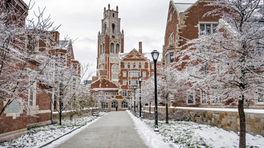Who Wants the Whole Truth? Colleges with Holistic Review
- Ryan Murphy

- Oct 1, 2016
- 4 min read

Many students assume that colleges only care about grades, GPA, rank, and SAT/ACT scores when determining admissions. Since these are the primary indicators of academic performance in high school, it makes sense that people would consider these the main factors that decide an acceptance or rejection.
However, while each college has different methods for measuring a student’s likely future performance and contribution, there has been a widespread trend to use what’s called “holistic review” to determine if a student’s fit for admission.
Holistic review--sounds appealing, right? It should be, unless you’re a student who cranked out long hours of study into the middle of the night, acing one class after the next like a robot programmed for perfection.
Amazingly enough, colleges are not looking for Perfect Student 1.0; they want people that show passion, curiosity, and humanity. They are not always so interested in seeing where the student has been, but where she is going.
So while colleges obviously do care about your academic performance, it is not what makes or breaks an application. It is one piece to a much larger puzzle, one that includes your identity, and your potential.
You may have spent a long time perfecting that academic piece, but unfortunately it won’t be enough to get you into the most selective universities. And even for less prestigious schools, or ones with higher acceptance rates, outstanding academics won’t be enough to guarantee a particular major or a scholarship opportunity.
To give you an idea of what a holistic review process actually entails, I will offer you text from UC Berkeley’s website, which outlines how its admissions officers look at many aspects of a student’s background when determining admissions outcomes:
The admission holistic review reflects our readers’ thoughtful consideration of the full spectrum of the applicant’s qualifications, based on all evidence provided in the application, and viewed in the context of the applicant’s academic and personal circumstances and the overall strength of the Berkeley applicant pool. Using a broad concept of merit, readers employ the following criteria which carry no pre-assigned weights:
1. The applicant’s full record of achievement in college preparatory work in high school, including the number and rigor of courses taken and grades earned in those courses.
2. Personal qualities of the applicant, including leadership ability, character, motivation, insight, tenacity, initiative, originality, intellectual independence, responsibility, maturity, and demonstrated concern for others and for the community are considered.
3. Likely contributions to the intellectual and cultural vitality of the campus. In addition to a broad range of intellectual interests and achievements, admission readers seek diversity in personal background and experience.
4. Performance on standardized tests, the SAT Reasoning Test or ACT Assessment plus Writing Test. In addition, any Advanced Placement or IBHL examinations the applicant may have taken will be considered.
5. Achievement in academic enrichment programs, including but not limited to those sponsored by the University of California. This criterion is measured by time and depth of participation, by the academic progress made by the applicant during that participation, and by the intellectual rigor of the particular program.
6. Other evidence of achievement. This criterion recognizes exemplary, sustained achievement in any field of intellectual or creative endeavor; accomplishments in extracurricular activities such as the performing arts or athletics; leadership in school or community organizations; employment; and volunteer service.
You should not take this information to the extreme and think that a student with a low GPA--say, a 2.9--and a low SAT score--such as an 1150--will have a likely chance at getting admitted to Ivy League schools because he wrote a compelling admission essay or has an impressive resume.
Many students will have high GPAs, near-perfect test scores, well-written essays, and stellar resumes. The point is that you cannot take anything for granted on your college application. Anything that you can list or state as a potential asset should be used. And while you may not be able to change grades or GPA, you can write strong essays and get glowing recommendations.
The bottom line is that studying hard is no free ticket to places like Stanford or Harvard. While you may think that your hard work should be enough to gain acceptance, it is only a guarantee that you have a seat at the table, that the most selective universities will give your application attention.
And it may even be that Student A, with a 4.0 GPA and perfect SAT scores, is passed for Student B, with a 3.5 GPA and above-average SAT scores. Why’s that? Because Student B started her own company. Because Student B spent summers working retail and wrote an articulate essay about the service industry.
If you have that golden ticket, that immaculate academic record, don’t let it go to waste with a tepid application. And if you don’t, work to shine your rough edges. Like it or not, there are thousands of students competing against you. When faced with these numbers, it’s no time to be humble or to shy away from making yourself stand out.
And you don’t have to go at the task alone. If you need help determining which classes to take throughout high school or how to master the art of a resume, then let B2A help you. We have services to guide your every step of the holistic process, for each piece of the puzzle. We can help you connect them into a whole.































